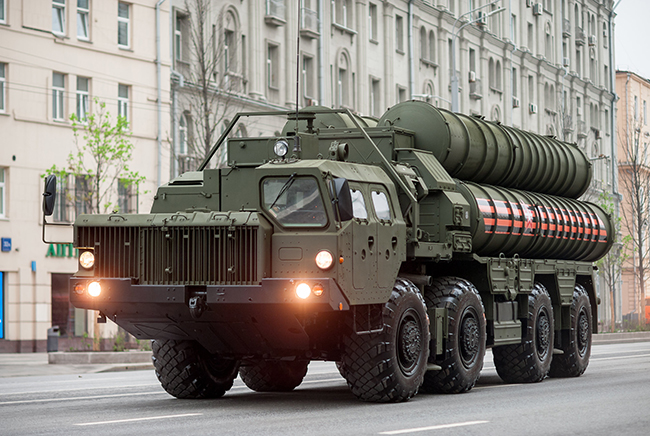
The S-400 Triumpf is shown in Moscow during a parade rehearsal in 2018. Photo by Dmitriy Fomin via Flickr.
Turkey on July 12 defied US threats and began receiving components of the Russian-made S-400 air defense system, a move the Pentagon has promised means Ankara will no longer receive the F-35.
A Russian cargo aircraft delivered the first components of the system to a military base outside the Turkish capital. Footage posted by the Russian Ministry of Defense shows Russian and Turkish personnel rolling off components and trucks from the aircraft, stating the delivery is the result of agreements between Turkish President Recep Tayyip Erdogan and Russian President Vladimir Putin.
Acting US Defense Secretary Mark Esper spoke with Turkish Defense Minister Hulusi Akar on July 12, and a Pentagon briefing with reporters about the delivery scheduled for that afternoon was postponed indefinitely. The Turkish Defense Ministry put out a lengthy statement about the call, which claims Turkey is under a “serious air and missile threat” that requires the missile system. Turkey again pressed for a working group on whether owning an S-400 can compromise the security of the F-35. The country claims it has “fulfilled all its obligations” in the F-35 program.
The long-expected delivery comes despite months of threats from the Pentagon, and will begin the process of “unwinding” Turkey from the F-35 program. The country had produced components for the jet, and was planning to purchase 100 of the aircraft.
In June, the Pentagon detailed the plan to remove Turkey from the program in a letter to Akar. The process begins by forcing Turkish F-35 pilots to leave US training locations at Eglin AFB, Fla., and Luke AFB, Ariz., along with kicking Turkish personnel out of the F-35 joint program office outside Washington, D.C.
Two F-35s have been produced for Turkey, and are at Luke. As of mid-June, the Defense Department had not decided what to do with those jets.
The JPO now needs to find separate companies to produce the parts that had been manufactured at Turkish facilities. These included the center fuselage of the jet, parts of the landing gear, engine components, and the panoramic cockpit display, among others.
Despite this, the Pentagon has maintained there will be no major delays to F-35 production if Turkey is removed.
The move is expected to trigger sanctions against Turkey under the Countering America’s Adversaries Through Sanctions Act, though President Donald Trump during a meeting with Erdogan last month hinted restrictions could be weakened.
“(Erdogan) has paid a tremendous amount upfront to Lockheed, our company, our jobs, everything and now they are saying he is using the S-400 system which is incompatible with our system and if you use the S-400 system, Russia and other people can gain access into the genius of the F-35,” Trump said during a press conference at the G20 summit on June 29 in Japan. “I’m all for our country, but he got treated very unfairly.”
The bipartisan leaders of the Senate Armed Services and Foreign Affairs committees said July 12 Erdogan has “chosen a perilous partnership with Putin at the expense of Turkey’s security.” The committee leaders urged Trump to fully implement CAATSA sanctions and terminate Turkey from the F-35 program.
“It did not have to come to this,” lawmakers wrote. “But unfortunately, President Erdogan rejected multiple attempts by the United States to preserve our strategic relationship while enabling Turkey to defend its airspace with F-35 aircraft and the Patriot air defense system.”